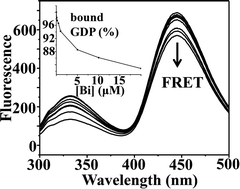The effects of EF-Ts and bismuth on EF-Tu in Helicobacter pylori: implications for an elegant timing for the introduction of EF-Ts in the elongation and EF-Tu as a potential drug target
Abstract
Helicobacter pylori is a common human pathogen responsible for various gastric diseases. Bismuth can effectively inhibit the growth of this bacterium and is commonly recommended for the treatment of the related diseases. Translation elongation factors EF-Tu and EF-Ts are two important components of the

- This article is part of the themed collection: Metallomics in China

 Please wait while we load your content...
Please wait while we load your content...